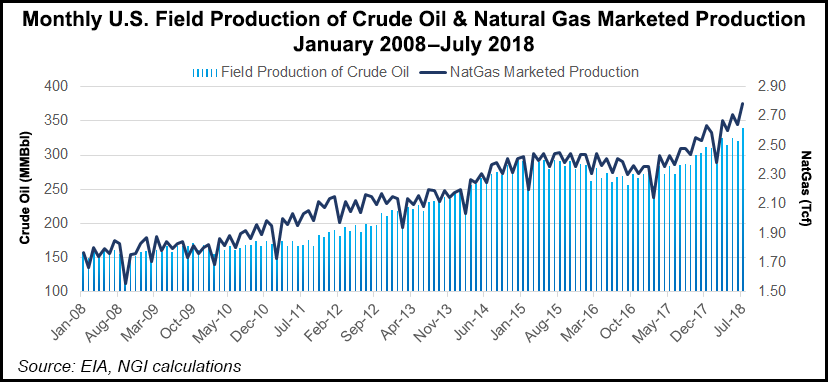Regulatory | NGI All News Access
EPA’s Wheeler Touts ‘Certainty’ Agenda in Shale Country Appearance
Environmental Protection Agency (EPA) acting Administrator Andrew Wheeler was back in Pittsburgh on Wednesday to reassure an oil and gas industry audience that his agency under President Trump is “removing regulatory barriers and leveling the playing field for American companies.”

Wheeler traveled to the Pittsburgh region to tour a Range Resources Corp. well site earlier this year on his first official trip outside of Washington, D.C. after being named acting administrator in July when Scott Pruitt resigned. He addressed the Shale Insight conference on Thursday, just two years after Trump received a warm reception from conference attendees when he was on the campaign trail.
Under Trump, Wheeler said, the EPA has finalized 28 deregulatory actions and has another 49 deregulatory actions in the works.
“Our goal is to free you to do what you do best, which is to innovate, create and produce,” he said in touting the less onerous methane emission rules the agency has proposed. Wheeler, who Trump said this week could be nominated to lead the agency officially, framed his presentation to the industry audience through the lense of certainty, and providing more of it not just for the regulated community, but for state regulators as well.
“The states are the primary implementers and enforcers of our environmental laws and programs, those closest to the issue are often best suited to address it, not bureaucrats in Washington,” he said.
Wheeler said the EPA has been trying to work more closely with states to rebalance regulatory roles. Those efforts, he added, have led to an “oil and gas action plan.”
For example, EPA is in the process of developing a new owner audit program tailored for the oil and gas sector that would “make it easier for the regulated community to self disclose and correct violations.
“We recognize that some in industry have been reluctant to take advantage of self-audit programs because they’re wary of EPA using that information against them for federal enforcement.” To counter that perception, Wheeler said the agency would sign a memorandum of understanding with Wyoming on Friday to “make clear” that EPA won’t use information provided under a state audit program to target enforcement.
Following EPA’s proposal in September to roll back some of the 2016 New Source Performance Standards for oil and gas, Wheeler said the agency is drafting a policy proposal assessing whether it makes sense to separately regulate methane.
“We will assess whether the entire oil and gas sector should be regulated as one source, given significant differences between production and processing and storage and distribution, or whether those should be split into separate sources,” Wheeler said. “If the source was split, it is not clear that the relative greenhouse gas emissions would be high enough to trigger the significant contribution criteria that is the prerequisite to setting a performance standard for recovering a pollutant under the Clean Air Act.”
Democratic Gov. Tom Wolf’s administration has been working in recent years to implement a broad plan to cut industry emissions in Pennsylvania, including methane. Permitting requirements for unconventional natural gas wells and some midstream facilities that were aimed at cutting air pollution took effect in August. State officials also have said that Trump’s plans to roll back some regulations won’t affect Wolf’s plans to curb emissions.
Wheeler reiterated that the agency is also trying to streamline its operations to improve the way it deals with industry and other stakeholders by tracking permits and legal actions. An effort is also underway, he said, to focus more on compliance than enforcement.
“I’m not advocating for letting people off the hook or reducing fines,” he said, “but rather I’m advocating for making enforcement decisions in a timely and consistent manner.” Enforcement efforts, Wheeler added, would primarily be focused on heavily populated nonattainment areas as opposed to more remote parts of the country, where the EPA expects industry to better comply with rules and regulations on their own.
Wheeler, a former coal industry lobbyist, was confirmed by the Senate last April as deputy EPA administrator. While Pruitt resigned in the face of numerous abuse of power allegations, Wheeler has faced criticism over his background.
He previously served as chief of staff for Sen. James Inhofe (R-OK), and worked at the EPA during the George H.W. Bush and Clinton administrations. He most recently worked as a principal at FaegreBD Consulting. Wheeler also is a former lobbyist and has represented Murray Energy Corp., which has sued the EPA over proposed changes to National Ambient Air Quality Standards.
His remarks Wednesday at Shale Insight, where about 1,000 attendees were expected for the three-day conference sponsored by the region’s leading trade groups, were delivered as environmental organizations, tribal members and other industry opponents had gathered for a demonstration march in the street to oppose the conference and its message.
© 2024 Natural Gas Intelligence. All rights reserved.
ISSN © 1532-1231 | ISSN © 2577-9877 |
